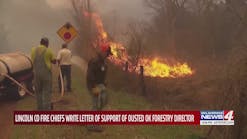Where did the '80s go? For that matter, what about the '90s? Remember when our normal call activity was an occasional house fire, a sick-case transport, a few public service calls, a car wreck, the "smell of something" and several cases of the "vapors"?
Now, a typical day sees us responding to multiple structural fires, vehicle crashes that require specialized extrication equipment, public service calls have turned into technical rescue and hazardous materials incidents, and the "vapors" are now medical incidents that require us to travel with a portable emergency room that we deliver to our customers' homes. If you are like most emergency service organizations, our duties have drastically changed with each additional responsibility requiring additional staffing, training and equipment to meet these ever-increasing calls for service. There is only one sticking point, and we all share this misfortune: someone needs to "show me the money."
We know money is not the end all, and simply throwing funding at a situation is surely not the complete answer. However, we need adequate funding to ensure that our organizations have the funding to provide firefighters and medics with the equipment required to meet our customers' ever-changing needs. In addition, we must secure funding to ensure that our members have the proper knowledge, skills and abilities to safely perform their constantly changing tasks.
In addition to all the responsibilities we have in managing an emergency services organization, we struggle daily with the fiscal challenge of running our departments and we must never lose sight of the importance of our organizations' fiscal strength. Depending on our organizational structure, funding could come from one or more of many sources. Most organizations no longer have the generous funding resources that were so abundant in past years. Money has become tighter, more scrutinized and less available. How many of us rely solely on tax dollars to fund our operations? How is that working for you? How about those of us that get no substantial funding from a tax base and rely on the community for support; is that working well for you?
There is no single reason for this funding decline, but it can be attributed to any number of factors. Local government budget cuts, fund drives that are not producing as they once did, and the sheer competition with other non-profit groups for donated monies are just a few examples. Another set of circumstances that has touched many communities has come in the form of a catastrophic event, which in many cases has devastated communities and taken a chunk out of funding resources. A catastrophic event could be anything from a major business shutdown, a natural disaster, catastrophic fires and severe weather events. Each of these examples eliminates jobs and reduces the potential tax base in your community. Unfortunately, these events are responsible for an increase in calls for service from this same community.
Another example of fiscal strain on your emergency service organization is the constant improvement of technology, which includes computers, terrorism response preparedness and apparatus costs that in many cases are closing in on seven-digit figures. This is a double-edged sword, as these improvements are developed to save the lives of our personnel and the customers we respond to. Unfortunately, they traditionally arrive with a large price tag that has not been budgeted for by our organization.
This series of articles will explore many time-tested options available to your emergency services organization in the arena of organizational alternative funding. These options will provide your organization with alternative-funding strategies to help relieve the financial stress we all seem to be facing. Many of these strategies will deal directly with the almighty dollar and several will deal with simple strategies your department can use to ensure your community knows who you are, what you provide to your customers and what a great investment you offer. Some of the alternative methods used to increase revenue are:
- 501(c)3 non-profit status — This designation given to your organization or community support group by the Internal Revenue Service is a must for ALL emergency services organizations. "Given" is an improper term, as we will walk you through the steps that must be taken by any organization seeking this status, including: articles of incorporation, board establishment, bylaws and registration with the state corporation commission. All public, private and corporate foundations require this vital designation before they will consider providing funding to your emergency services organization.
- Ambulance billing — We will review a proven recipe to this often-controversial practice that is more commonplace than one would expect. With our business going through an unprecedented increase of responses to emergency medical incidents, we owe it to ourselves to explore this option as a means to bring in untapped fiscal resources to our budget.
- Fees for service — Much of the work we perform in the community that has to do with saving the lives of our citizens and reducing property loss to their homes and businesses has nothing to do with responding to emergencies. We are talking about fire inspections, plans review activities and event staffing. We will explore the mechanisms to put a plan into place to recoup funding for these vital services.
- Grants — Our business has never been in a more "grant-friendly" era as we are now, but are we taking advantage of these opportunities? We will discuss grant strategies letting your organization tap into federal funding and the often-overlooked private and public foundations that give daily to emergency services organizations.
- Event planning — "We will provide you with proven methods to coordinate any event, large or small. From staffing, sponsorships, advertising, media participation and community participation, we will share with you time-tested tips to ensure your event is properly planned and managed.
- Marketing — Do your customers know what your members and organization provide to the community? When was the last time you spoke at a service club meeting? Do you have a "smoke detector give away" program? Marketing your emergency services organization is a must in today's fiscally challenging times. This article will guide you through several successful programs that will allow you to "meet your customers on a good day."
The information in this series of articles will typically require a change in your organizations philosophy. We always talk about thinking outside the box; we want to take this a step further and eliminate the box all together so there is no chance to fall back into the old way of doing business. We want you to view these decisions as if you were running a business, because, guess what? You are.
Getting rid of the box will also mean stepping into a different role. You have to take off your fire or EMS operational cap and put on your budget director cap. The decisions you make as the budget director have nothing to do with apparatus placement, drug therapies, hoseline deployment or landing zones. We now must think of long-term fiscal planning, budget allocations and alternate funding sources that will allow your emergency service organization to meet today's financial challenges and ensure your organization's financial stability for the future.
C. E. "GENE" REAMS is a retired division commander for the Chesterfield, VA, Department of Fire and EMS. He is currently the marketing and client relations director for Diversified Ambulance Billing. MARK R. NUGENT is an operations battalion chief for the department and the owner of SecureGrant of America, providing grant-writing and consultant services.





